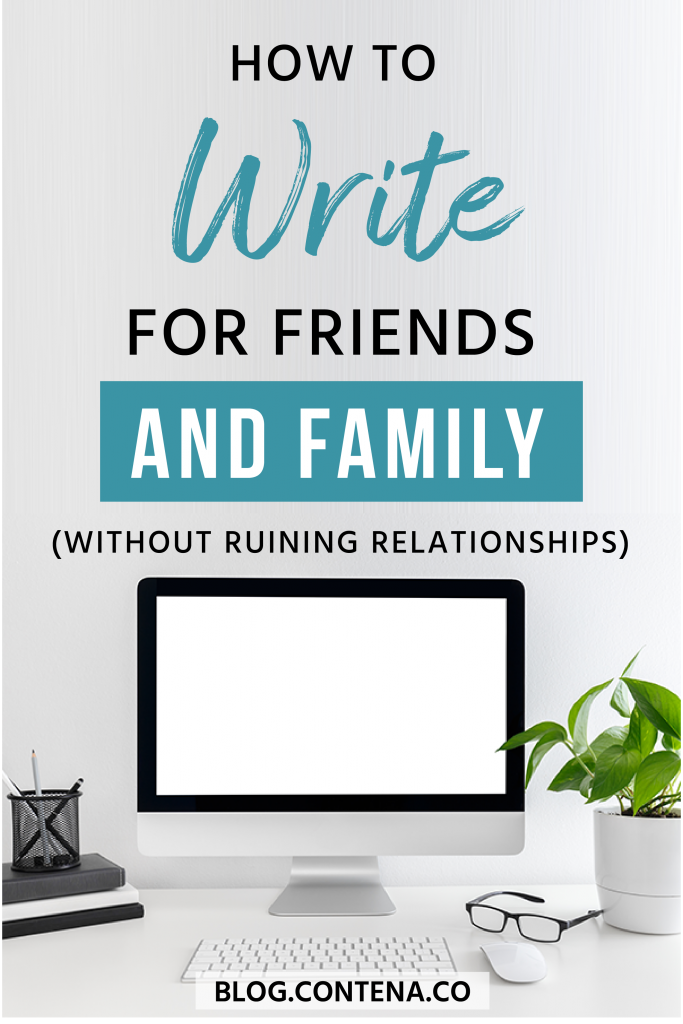Do you have friends and/or family who you do freelancing “work” for?
I say “work” because you may or may not be getting paid!
Are you a professional freelancer (or one in-the-making) and have supportive friends and family who are excited to utilize your services, but you’re uncomfortable with the idea of charging them (or you’re uncomfortable telling them your usual rates)?
Are you just staring your freelance writing biz and you think your friends and family might have work they could hire you for, but you’re not sure how to approach that because friends and family and money can sometimes get sticky?
Then this article is for you!
Running into issues with having friends and family as clients isn’t uncommon. Chances are, you fall into one of two categories:
- You’re brand new/newish to freelance writing
- You’re more established as a writer
In any case, having your friends and family as clients, or even potential clients can get a little sticky.
Let’s tackle each of these situations to help you figure out how to best work with your friends and family as a freelance writer.
You’re brand new/newish to freelance writing
So you want to be a freelance writer?
You’ve decided to start your freelancing business. You want to create a portfolio and a resume but you realize you have little-to-no experience.
You think about getting some freelance writing work and want to utilize your network to help you find some writing opportunities.
Or, maybe you’re starting in a new niche or offering a new service like editing so you want to get some experience in those areas.
Utilizing your immediate network of family and friends is a great idea- chances are, you know people who need writing of some kind done.
When you start reaching out to your network, you may say something like, “I’m starting to do some freelance writing- anyone have any projects they need help with?”
And all of a sudden you have friends or friends-of-friends reaching out for “help.”
They don’t mention officially hiring you, and the topic of pay doesn’t come up. So maybe you agree to work for free (which can be a good idea in the beginning) or for rates you’re not super excited about, but at least you’re getting paid!
This is a common way to start your freelancing business and it’s great when your friends and family support your business.
HOWEVER- notice how you set yourself up to NOT be paid.
If you’re just starting out, consider sending out a message that says you’re now working as a freelance writer, and if anyone is looking to hire a [fill in your area of focus here], you’re offering
This way, you’re putting it out there at the beginning that you expect to be paid.
Keep in mind, that like all projects, if you’re charging, you probably want to gather as much information as possible so that you know how to price the project, based on the amount of time it will likely to take.
You can then decide what your friends and family rate is, for
Or, if you make a choice to work for free, that’s okay too- you can decide.
But ideally you go into the situation feeling good about the exchange- you’re providing value, so you should get something in return. Even when you’ve got no experience.
You might get money, a link for your portfolio, or a testimonial.
But what happens when your friends and family continue to expect you to work for free, or the rate you first quoted feels too low?
Keep reading!
You’re more established as a writer
Once you’ve built up your business a bit, you might come to realize that what you charged (or didn’t charge) your friends and family no longer feels like a fit.
What can you do?
First off, there’s a certain mentality that you want to make sure you
Remember you have value
You need to know that you provide value. Your words are worth something. Yes, earlier on in your writing journey, your words may have been worth just the link or the testimonial, but with more experience, your words (or editing, SEO, or whatever service you provide) are worth money.
When it comes to asking friends and family to pay you money, it’s even more important that you believe in your value.
Communicating to Friends and Family about Payment for Your Work
Before you have the money conversation, it’s useful to have an understanding of what you would charge someone else for this work. You might already know, because other people are paying you for the same thing.
If you’re not getting paid for the work by other people, determine what you would charge for the same type of work.
For example, if someone has been having you do weekly, well-researched, blog content at about 1,000 words an article, plus sourcing images, and this takes you on average 3-4 hours to complete, then your fee might normally be around $300/article.
This can be a good starting point to discuss rates.
However, you can also utilize information about the client’s business and niche to help you determine your rate. Your sister’s growing alpaca-wool sock business probably can’t afford to pay you $300/article, but your cousin’s hedge fund managing company probably can.

Is there a friends and family rate?
Decide if you want to have a friends and family rate, what it will be (a percentage off of what you normally charge is usually a good way to go), and determine how often you offer this rate.
For example, maybe you offer 30% off as a friends and family rate, but you only allow 25% of your workload to be friends and family.
Keep in mind, it’s okay to have a point in your business where you charge everyone the same, and that you don’t haveto have a friends and family rate. You can charge everyone and their mother (and your mother, too, if you want).
Bite the bullet and send the email
You can tell someone about your rate (or change in rate) face-to-face, but an email often feels a bit easier (and then it’s in writing!).
When the time comes to let someone know that you need to change the way you charge, as uncomfortable as that may feel, it will probably be better than continuing to work for a rate that you’re uncomfortable with. You don’t want to build up resentment toward someone because you’re not feeling valued.
You’re not alone in the awkwardness this can bring, so here are what some experienced freelancers do in this sort of situation, and the phrases that they use to bring up the topic with their friends and family:
It was REALLY hard for me to learn how to charge for my services at first. It gets easier over time…. Here are some phrases that I use: “Would you like me to send you an email with my rates?” “My hourly rate is X, and I anticipate your project would take three hours on the clock.”
The phrase “on the clock” is key… it somehow kicks into people’s brains in a super-specific way. I have a pre-set email response I can send when someone inquires about my rates, that makes it less “personal” in the sense that everyone gets the same email.
Over time, I have gotten rid of my lower rates. The people who want to work with me are happy to pay me what I am worth. The people who don’t find someone else.
Stephanie Weaver, TED-style speaker coachWin win .
I experience this all the time, and I still feel so guilty. My first response to any inquiry includes something like: “I’d love to work with you, but just so we’re on the same page (hah!), I can’t afford to work for free. What’s your budget for this? I pride myself on being flexible, and I’m hopeful we can figure out an arrangement that respects my time and your budget.”
(Nothing like a really bad joke to defuse awkwardness)
Hannah Wood, Freelance editor, consultant, and writer
It’s uncomfortable for almost everyone, and making the change from doing it for free to doing-it-for biz is awkward AF…. What I say when this comes up (because it comes up alllll the time) is something like this:
Eryka Lynn Peskin, Mindset Coach
Oh, thank you for the compliment! I’d love to support you. As you may know, I’ve started a business doing exactly this, so I don’t do this for free anymore. But! I heart you, so I’m completely happy to offer you the friends and family rate of xyz. Is that doable for you?
Most of us will go through something like this at some point in time- raising your rates and talking money canfeel uncomfortable (especially when friends and family are involved), but the more you do it, the easier it will become.
Remember that your work holds value and that it’s more than okay to be paid for your writing (even by your friends and family members!).










